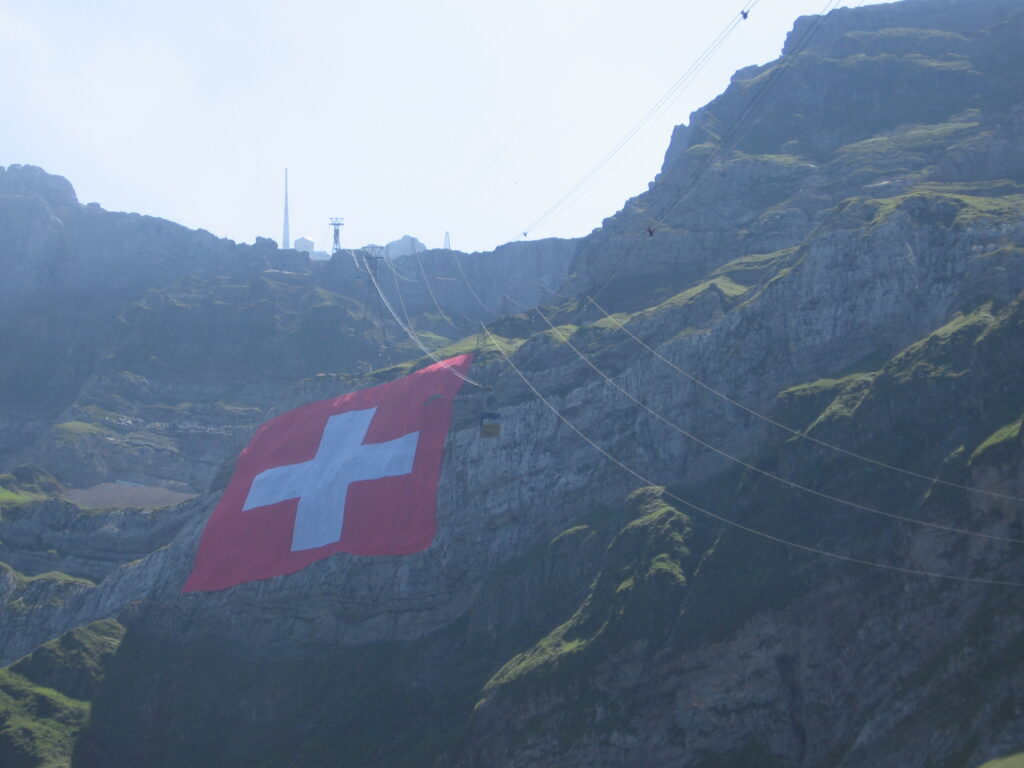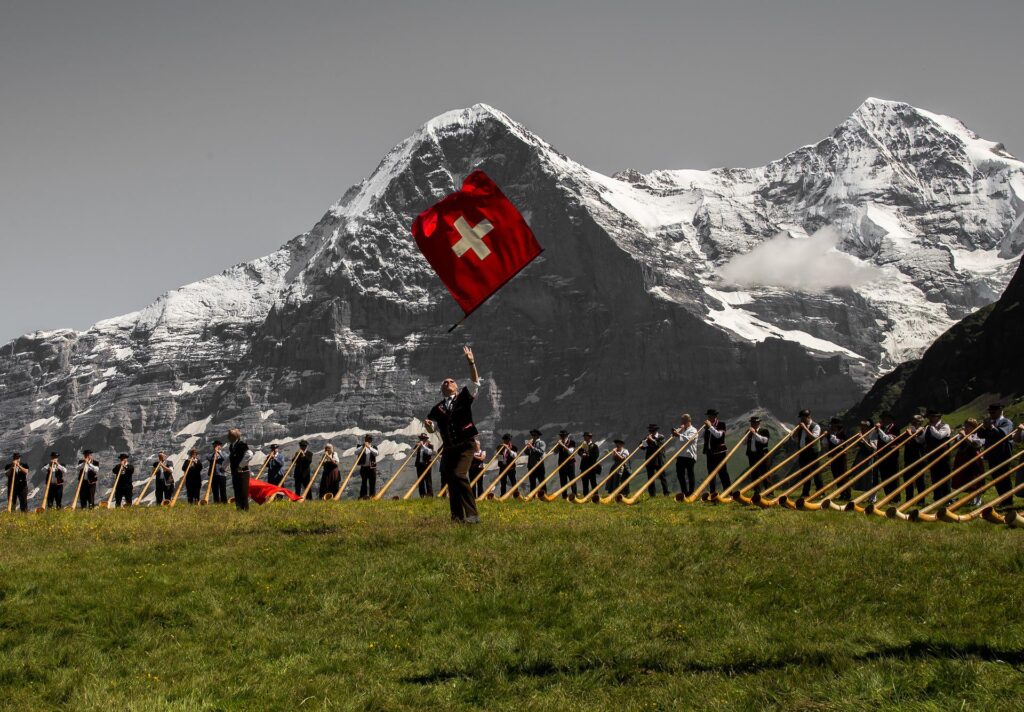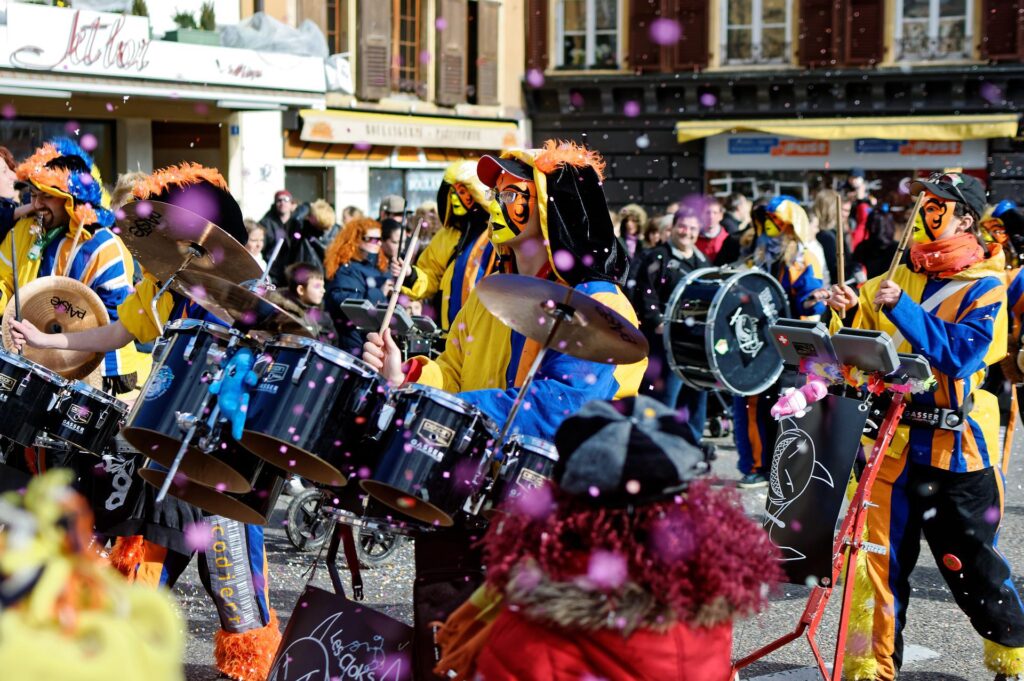Public holidays in the Swiss Confederation
In Switzerland, the 26 cantons that make up the Swiss Confederation are free to set their own public holidays, with the exception of 1 August, which is a national holiday at federal level.

Official public holidays follow ecclesiastical, historical and historical-industrial lines that vary in each canton.
The only four public holidays that apply in all the country’s cantons are New Year’s Day, Ascension Day, Christmas Day and 1 August.
Good Friday, Easter Monday, Whit Monday and Boxing Day are also celebrated in most parts of the country. All other public holidays are restricted to certain cantons or only to certain districts and communes within individual cantons.
With the exception of 1 August and 1 May (Labour Day), most public holidays in Switzerland are of ecclesiastical origin. As a basic rule, it can be said that there are a few more public holidays in the Catholic cantons than in the Reformed cantons, as the regulation of all other public holidays is in the hands of the cantons and there can also be differences within individual cantons.
The canton of Ticino with its 15 public holidays ranks first in terms of public holidays, while the canton of Appenzell Ausserrhoden with 8 public holidays, on a par with Graubünden, but with the aggravating circumstance that if Christmas falls on a Monday, Boxing Day is a public holiday, ranks last.
Regional and local public holidays
In addition to national or general public holidays, there are a large number of regional and local public holidays in Switzerland. These are often limited to individual districts or just a few municipalities and can be church festivals, fairs, etc. Some of these local festivals are recognised by the local authorities. Some of these local festivals are recognised by law, but several are celebrated traditionally even though they are not protected by law.
Only the cantons of Vaud and Thurgau do not have festivities that are only regionally valid or that are not recognised by law, but are nevertheless celebrated by the majority. In some other cantons, such as Schaffhausen and Nidwalden, there are festivities that are celebrated by the majority even though they are not recognised by law, but none that are only valid in certain communes.
Sechseläuten – Zurich’s spring festival

Religious holidays
Catholic public holidays such as Corpus Christi, Assumption, All Saints’ Day and Immaculate Conception are only exempt from work in regions with a predominantly Catholic population and are regular working days in Reformed regions. These public holidays apply, for example, in the Catholic canton of Appenzell Innerrhoden, but not in the Reformed Appenzell Ausserrhoden.
In the canton of Aargau, the subdivision is more diverse for denominational reasons, since the traditions in the Reformed, Catholic, Christian-Catholic (Rheinfelden) and mixed Reformed-Catholic (Baden) areas are taken into account.
In the canton of Graubünden, municipalities have the right to designate at least one additional public holiday. As a result, in many municipalities some of the Catholic feasts are public holidays, and in some places there are local church and patron saints’ days that are celebrated as public holidays.
In the cantons of Lucerne, Solothurn and Schwyz, most municipalities celebrate so-called church festivals on the day of the local patron saint, so there are a large number of regional festivals that are only valid in a single municipality or at most in one district.
Cantonal breakdown of major public holidays
Epiphany
This holiday is considered a public holiday in parts of Graubünden, as well as in Schwyz, Ticino and Uri.
Good Friday
Good Friday is a public holiday in the cantons of Aargau, Appenzell Ausserrhoden, Appenzell Innerrhoden, Basel-Landschaft, Basel-Stadt, Bern, Fribourg, Geneva, Glarus, Graubünden, Jura, Lucerne, Neuchâtel, Nidwalden, Obwalden, Schaffhausen, Schwyz, Solothurn, St Gallen, Thurgau, Uri, Vaud, Zug and Zurich. In the Canton of Ticino, this is not a public holiday, but most offices and banks remain closed.
Easter Monday
Easter Monday is a public holiday in the cantons of Appenzell Ausserrhoden, Appenzell Innerrhoden, Basel-Landschaft, Basel-Stadt, Bern, Geneva, Glarus, Graubünden, Jura, Schaffhausen, St. Gallen, Ticino, Thurgau, Vaud, Zurich and in some municipalities of Aargau and Solothurn. In Schwyz and Uri, it is a legally recognised day of rest, while in the cantons of Fribourg, Lucerne, Neuchâtel, Nidwalden, Obwalden and Zug, Easter Monday is also largely a day of rest.
1st May
This holiday dates back to the US workers’ struggle to establish the eight-hour day in 1886 and is now a public holiday in many states. In Switzerland it took place for the first time in 1890.
Labour Day is an official holiday in only eight cantons: Basel-Stadt, Basel-Landschaft, Jura, Neuchâtel, Schaffhausen, Ticino, Thurgau and Zurich. In the cantons of Aargau and Solothurn, people often only work until midday. In other cantons, some municipalities celebrate 1 May as a day to commemorate the local patron saint.
Mother’s Day
This is not a public holiday in Switzerland, which is always celebrated on the second Sunday in May, as it is in many other countries around the world.
Ascension Day
Ascension Day is a Christian feast day in Switzerland, celebrated in all cantons on the 40th day after Easter, which makes it a variable feast day. This day is treated as a Sunday.
Whit Monday
It is celebrated 50 days after Easter Monday, and is one of the highest regional Christian feasts in Switzerland.
In the cantons of Appenzell Innerrhoden, Appenzell Ausserrhoden, Bern, Basel-Landschaft, Basel-Stadt, Geneva, Graubünden, Jura, St Gallen, Schaffhausen, Thurgau, Vaud and Zurich it is a public holiday equivalent to Sunday. In the cantons of Glarus, Schwyz, Ticino and Uri, it is a legally recognised day of rest.In the cantons of Fribourg, Lucerne, Neuchâtel, Nidwalden, Obwalden and Zug, it is not a public holiday, but a day of rest throughout the canton.In the cantons of Aargau and Solothurn, it is a public holiday only in some communes.In the canton of Valais, it is a normal working day throughout the canton.
Father’s Day in Switzerland
There is no official Father’s Day in Switzerland. However, the unofficial Father’s Day is celebrated on the first Sunday in June, and is intended above all to be a father-son day. In the canton of Ticino, Father’s Day is celebrated on 19 March, as in neighbouring Italy.
Corpus Christi
Corpus Christi is a Catholic feast day celebrated on the 60th day after Easter, and is a public holiday in some parts of Switzerland. Corpus Christi is a regional feast day celebrated in the Catholic cantons of Appenzell Innerrhoden, Jura, Lucerne, Nidwalden, Obwalden, Schwyz, Ticino, Uri, Valais and Zug. It is also a public holiday in some Catholic communities in the cantons of Aargau, Fribourg, Graubünden, Neuchâtel and Solothurn.
Swiss National Day
The National Day of the Swiss Confederation is celebrated on 1 August and has been a non-working day throughout Switzerland since 1994.

Assumption of the Virgin Mary
The Assumption is a public holiday equivalent to Sunday, celebrated on 15 August in the following cantons: Lucerne, Obwalden, Nidwalden, Schwyz, Ticino, Uri, Valais and Zug, as well as in some communes in the cantons of Aargau, Basel-Landschaft, Fribourg, Graubünden and Solothurn.
In the cantons of Appenzell-Innerrhoden and Jura it is a recognised public holiday, while in the other cantons it is an ordinary working day.
All Saints’ Day
All Saints’ Day is a public holiday in many Catholic states and regions, celebrated on 1 November.
In Switzerland, it is celebrated as a public holiday in the predominantly Catholic cantons of Appenzell Innerrhoden, Glarus, Jura, Lucerne, Obwalden, Nidwalden, St Gallen, Schwyz, Ticino, Uri, Valais and Zug, as well as in parts of Aargau, Basel-Landschaft, Fribourg, Graubünden and Solothurn.
St Nicholas
A holiday celebrated on 6 December, Samichlaus, as it is known in German-speaking Switzerland, is based on traditions surrounding St Nicholas, the Greek bishop of Myra in present-day Turkey and giver of gifts. St Nicholas is said to have shown particular kindness to children and was associated with the offering of gifts. The celebration of St Nicholas Day takes place mainly in the German-speaking cantons and dates back centuries. The celebrations vary between the language regions and between the Catholic and Protestant cantons. It is a normal working day.
Immaculate Conception
In the Catholic cantons and municipalities of Switzerland, 8 December is a public holiday or day of rest equivalent to Sunday.
Boxing Day
In Switzerland, this holiday is an official holiday in only a few cantons and is celebrated in Appenzell Ausserrhoden, Appenzell Innerrhoden, Basel-Landschaft, Basel-Stadt, Berne, Glarus, Graubünden, Lucerne, Schaffhausen, St Gallen, Thurgau, Ticino and Zurich, as well as in parts of Aargau and Solothurn.
In the cantons of Fribourg, Nidwalden, Obwalden and Zug, Boxing Day is not legally recognised as a public holiday, but is nevertheless generally a day of rest.
In the cantons of Schwyz and Uri, it is a cantonal day of rest.






